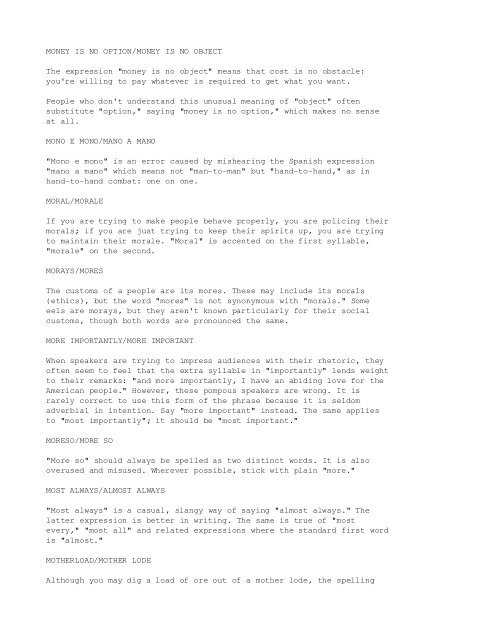Common_Errors_in_English_usage
Common_Errors_in_English_usage
Common_Errors_in_English_usage
You also want an ePaper? Increase the reach of your titles
YUMPU automatically turns print PDFs into web optimized ePapers that Google loves.
MONEY IS NO OPTION/MONEY IS NO OBJECT<br />
The expression "money is no object" means that cost is no obstacle:<br />
you're will<strong>in</strong>g to pay whatever is required to get what you want.<br />
People who don't understand this unusual mean<strong>in</strong>g of "object" often<br />
substitute "option," say<strong>in</strong>g "money is no option," which makes no sense<br />
at all.<br />
MONO E MONO/MANO A MANO<br />
"Mono e mono" is an error caused by mishear<strong>in</strong>g the Spanish expression<br />
"mano a mano" which means not "mantoman" but "handtohand," as <strong>in</strong><br />
handtohand combat: one on one.<br />
MORAL/MORALE<br />
If you are try<strong>in</strong>g to make people behave properly, you are polic<strong>in</strong>g their<br />
morals; if you are just try<strong>in</strong>g to keep their spirits up, you are try<strong>in</strong>g<br />
to ma<strong>in</strong>ta<strong>in</strong> their morale. "Moral" is accented on the first syllable,<br />
"morale" on the second.<br />
MORAYS/MORES<br />
The customs of a people are its mores. These may <strong>in</strong>clude its morals<br />
(ethics), but the word "mores" is not synonymous with "morals." Some<br />
eels are morays, but they aren't known particularly for their social<br />
customs, though both words are pronounced the same.<br />
MORE IMPORTANTLY/MORE IMPORTANT<br />
When speakers are try<strong>in</strong>g to impress audiences with their rhetoric, they<br />
often seem to feel that the extra syllable <strong>in</strong> "importantly" lends weight<br />
to their remarks: "and more importantly, I have an abid<strong>in</strong>g love for the<br />
American people." However, these pompous speakers are wrong. It is<br />
rarely correct to use this form of the phrase because it is seldom<br />
adverbial <strong>in</strong> <strong>in</strong>tention. Say "more important" <strong>in</strong>stead. The same applies<br />
to "most importantly"; it should be "most important."<br />
MORESO/MORE SO<br />
"More so" should always be spelled as two dist<strong>in</strong>ct words. It is also<br />
overused and misused. Wherever possible, stick with pla<strong>in</strong> "more."<br />
MOST ALWAYS/ALMOST ALWAYS<br />
"Most always" is a casual, slangy way of say<strong>in</strong>g "almost always." The<br />
latter expression is better <strong>in</strong> writ<strong>in</strong>g. The same is true of "most<br />
every," "most all" and related expressions where the standard first word<br />
is "almost."<br />
MOTHERLOAD/MOTHER LODE<br />
Although you may dig a load of ore out of a mother lode, the spell<strong>in</strong>g





